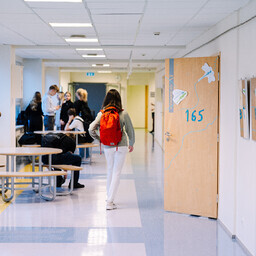Koolid peavad ise otsustama, kuidas reguleerida mobiiltelefonide kasutamist.
Haridusministeerium usaldab koole
ja annab neile vabaduse oma reeglid luua.
Haridusministeerium usaldab koole
Tõlge fraasile: Haridusministeerium usaldab koole
EN
The Ministry of Education trusts schools
Merili Murakas, haridusministeeriumi ekspert, ütleb, et koolidel on kohustus reguleerida nutiseadmete kasutamist. Tema sõnul on igas koolis erinevad mured ja vajadused.
Kooli kodukorras peab olema kirjas
, kuidas nutiseadmeid kasutada.
Eesmärk on aidata õpilastel keskenduda õppimisele
ja hoida nende vaimset tervist.
Kooli kodukorras peab olema kirjas
Tõlge fraasile: Kooli kodukorras peab olema kirjas
EN
The school's rules must state
Eesmärk on aidata õpilastel keskenduda õppimisele
Tõlge fraasile: Eesmärk on aidata õpilastel keskenduda õppimisele
EN
The goal is to help students focus on learning
Murakas rõhutab, et nutiseade on laste elu oluline osa. Seetõttu ei saa tugineda ainult varasemate põlvkondade kogemustele. Koolid saavad abi ministeeriumi ja Tervise Arengu Instituudi soovitustest.
Tallinna Arte gümnaasiumi direktor Liina Altroff ütleb, et nende koolis algklassides telefonide kasutamine on keelatud. Gümnaasiumis on telefonid tunnis keelatud, kui õpetaja pole teisiti öelnud.
Altroff ei poolda telefonide ärakorjamist koolis. Tema sõnul on telefon õpilase isiklik vara ja tema vastutus. Koolil pole õigust seda kuidagi hallata.
Tallinna Vanalinna Haridusgümnaasiumi (VHK) direktor Anu Nigesen arvab, et ühtsed reeglid kõikidele koolidele oleksid lihtsamad. Tema sõnul on nutiseadmete kasutamine keeruline teema. Kool püüab leida viise, kuidas neid arukalt kasutada.
VHK-s peavad põhikooli õpilased panema telefonid kappi koolipäeva ajaks. Gümnaasiumi õpilased on aga täiskasvanud ja mõistavad, et telefon võib segada õppimist.
Mobiiltelefonide kasutamise ühtlustatud reegleid
on Eestis nõudnud mitu vabaühendust. Näiteks soovib MTÜ Kogukonna Hüvanguks, et telefonid oleksid koolis keelatud.
Mobiiltelefonide kasutamise ühtlustatud reegleid
Tõlge fraasile: Mobiiltelefonide kasutamise ühtlustatud reegleid
EN
Standardized rules for mobile phone use
Schools must decide for themselves how to regulate mobile phone use. The Ministry of Education trusts schools and gives them the freedom to create their own rules.
Merili Murakas, an expert at the Ministry of Education, says that schools have a duty to regulate the use of smart devices. According to her, each school has different concerns and needs.
The school's code of conduct must specify how to use smart devices. The goal is to help students focus on learning and maintain their mental health.
Murakas emphasizes that smart devices are an important part of children's lives. Therefore, we cannot rely solely on the experiences of previous generations. Schools can seek advice from the ministry and the Institute of Health Development.
Liina Altroff, director of Tallinn Arte Gymnasium, says that in their school, the use of mobile phones is prohibited in elementary grades. In the gymnasium, phones are banned during class unless the teacher says otherwise.
Altroff does not support confiscating phones at school. According to her, a phone is a student's personal property and their responsibility. The school has no right to manage it in any way.
Anu Nigesen, director of Tallinn Old Town Educational Gymnasium (VHK), believes that uniform rules for all schools would be simpler. According to her, the use of smart devices is a complex issue. The school tries to find ways to use them wisely.
At VHK, elementary school students must put their phones in a locker for the duration of the school day. Gymnasium students, however, are adults and understand that phones can interfere with learning.
Several NGOs in Estonia have called for unified rules on mobile phone use. For example, the NGO Community Welfare wants mobile phones to be banned in schools.

